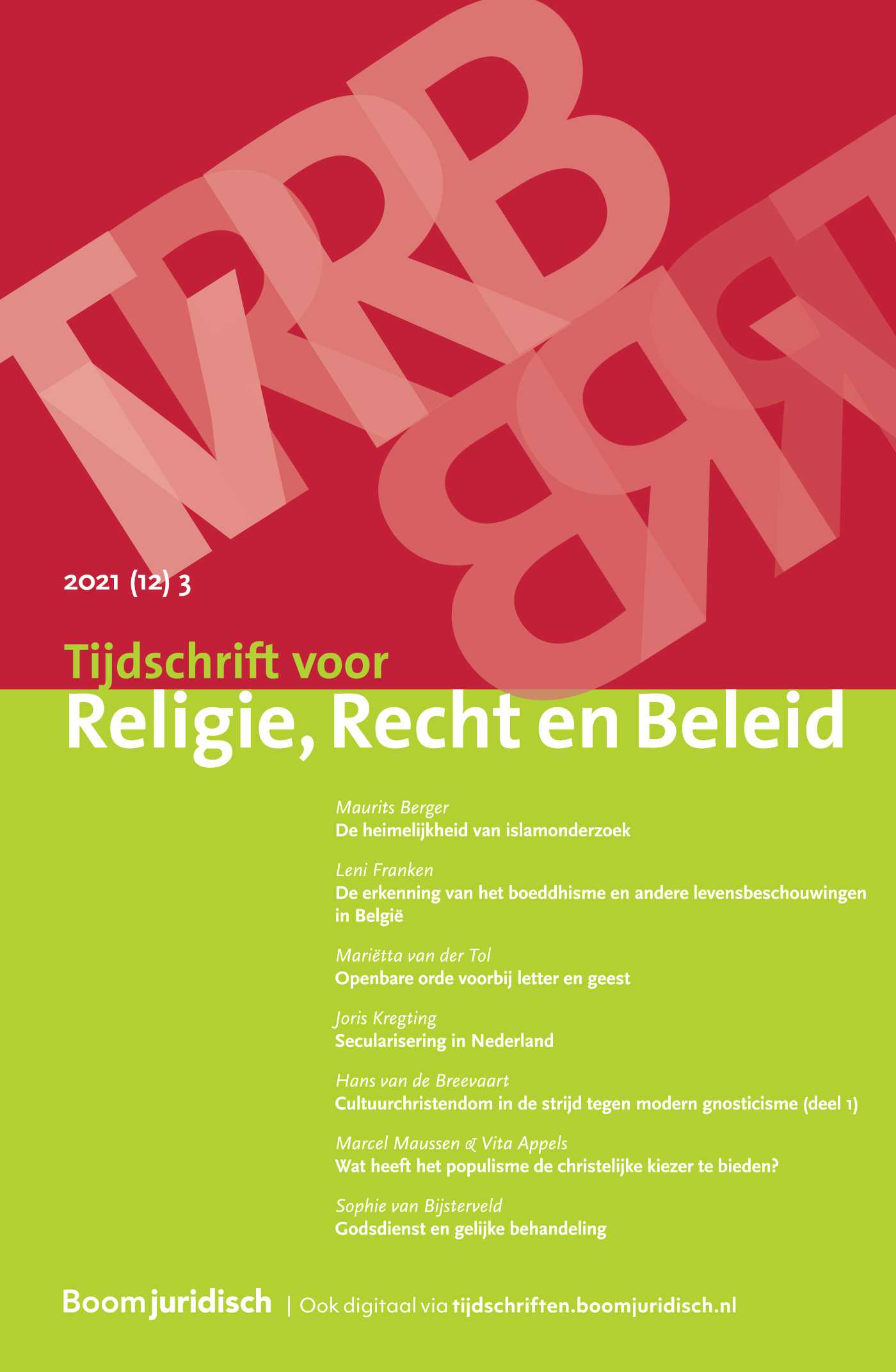|
Religion-related stress is the product of a predominantly secular society in which people are confronted with diverse religious practices. The phenomenon occurs where public meets private. How can employers ensure compliance with conflicting religious and other commitments in the workplace? The concept of respectful pluralism as formulated by Douglas Hicks in his book Religion and the Workplace, may go a long way to negotiating a solution to the debate between conformity and diversity. |


Tijdschrift voor Religie, Recht en Beleid
Meer op het gebied van Algemeen
Over dit tijdschriftMeld u zich hier aan voor de attendering op dit tijdschrift zodat u direct een mail ontvangt als er een nieuw digitaal nummer is verschenen en u de artikelen online kunt lezen.
| Diversen |
|
| Auteurs | Maurits Berger |
| Auteursinformatie |
| Artikel |
|
| Auteurs | Marjolein Rikmenspoel |
| SamenvattingAuteursinformatie |
| Artikel |
|
| Auteurs | Jan Hendriks |
| SamenvattingAuteursinformatie |
|
Since many churches can no longer be used for divine worship, the canonical procedure for the relegation of churches to profane use has gained much interest among both faithful and citizens who want a church not to be closed down or even demolished. Many times parishioners take recourse against the Bishop’s administrative decree deciding the relegation of a church to profane use, i.e. that the church building is no longer designated for Catholic worship. It is extremely important for a bishop, therefore, to fulfil all the requirements of the law in making this decision. In this article the different steps of this procedure and of the administrative recourse to the Congregation of the Clergy and the Supreme Court of the Apostolic Signature are explained. |
| Artikel |
|
| Auteurs | Sophie van Bijsterveld |
| SamenvattingAuteursinformatie |
|
This is the second part of an analysis of the use of the qualification of the state as ‘neutral and impartial organiser of religions’ by the European Court of Human Rights (ECtHR), the first part of which appeared in the previous issue of this Journal. This part sets off with a discussion of the use of the qualification of the state as ‘neutral and impartial organiser of religions’ in cases concerning the place of religion in education. Subsequently, a variety of cases is dealt with that challenge restrictions on religious liberty set by the state or restrictions by third parties tolerated by the state. Finally, this contribution offers an overarching reflection on the use by the ECtHR of the qualification of the state as ‘neutral and impartial organiser of religions’ in its case law. It concludes that this qualification, which has no explicit treaty basis, is an inadequate standard for use at the international level and that the ECtHR itself is hardly ‘neutral’ in its application of the standard. |
|
The article deals with an unknown chapter of the history of Muslims in the Netherlands in the interwar period. It follows the public debate about the construction of the first mosque in The Hague before the Second World War. The first initiative was made in 1929 by the Dutch convert to Islam Mohammed Ali van Beetem, who played a leading role among the Indonesian Muslim community in the Netherlands. After more than two decennia of debate and negotiations with the municipal authorities in The Hague, the first mosque was finally built by the Ahmadiyya-mission in 1955. |
| Artikel |
|
| Auteurs | Marja Jager-Vreugdenhil |
| SamenvattingAuteursinformatie |
|
The Dutch Social Support Act aims at a bigger role for the civil society in informal care. This appeal includes churches. In this article, the question is: do churches indeed want to participate more in social support? And what is subscribed to churches in the Social Support Act? |

 Aflevering 3
Aflevering 3